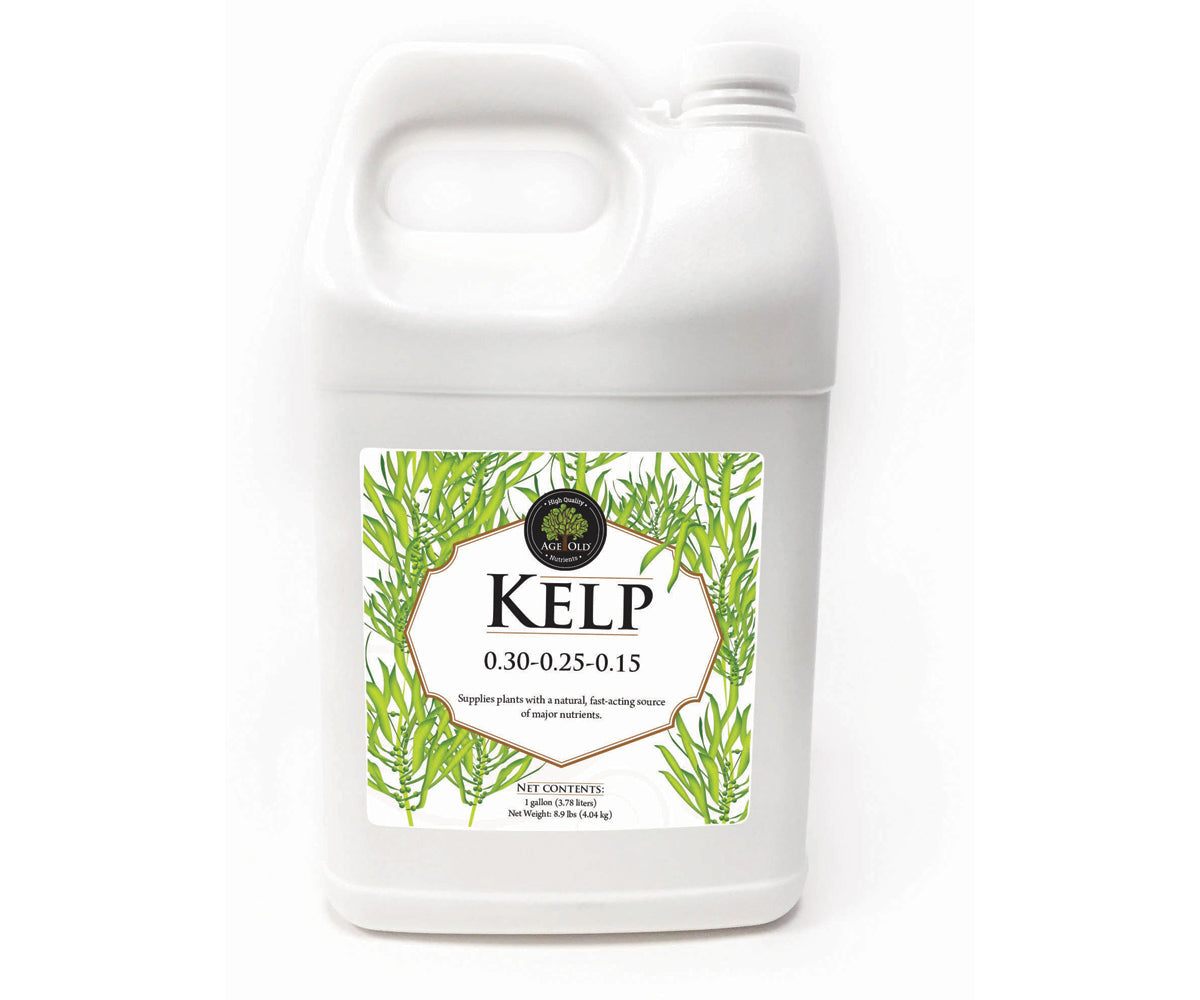Age Old
Age Old Kelp, 1 gal
Age Old Kelp, 1 gal
17 in stock
Couldn't load pickup availability
Payment options
- Fast Delivery
- Easy Returns
- Secure Checkout
Description
Description
Age Old Kelp is a premium, all-natural liquid fertilizer derived from the finest Ascophyllum nodosum seaweed, also known as brown kelp. This organic supplement is designed to promote robust plant growth and enhance overall plant health. Age Old Organics, the manufacturer, is committed to providing eco-friendly, sustainable solutions for home gardeners and professional growers.
Key Features:
Pure Seaweed Extract: Age Old Kelp is crafted from 100% pure seaweed extract, ensuring a natural and organic source of essential nutrients.
Wide Nutrient Spectrum: It contains a balanced array of macro and micronutrients, vitamins, amino acids, and natural plant growth regulators to support plant vitality.
Natural Hormones: The natural hormones in seaweed extract contribute to improved root development, stress resistance, and flowering and fruiting.
Bioactive Compounds: Alginic acid, cytokinins, and auxins help boost plant immunity, reduce stress, and increase nutrient uptake.
Versatile Application: Suitable for use in soil, hydroponics, and foliar feeding, providing flexibility in application methods.
Environmental Friendly: Age Old Kelp is environmentally friendly and free of synthetic chemicals, making it a sustainable choice for eco-conscious growers.
Benefits of Using Age Old Kelp:
Enhanced Plant Growth: Kelp's naturally occurring growth hormones encourage healthy vegetative growth, strong root systems, and prolific flowering and fruiting.
Increased Nutrient Uptake: Age Old Kelp facilitates the absorption of essential nutrients, leading to healthier and more robust plants.
Improved Stress Tolerance: The natural compounds in kelp extract help plants endure environmental stressors such as drought, temperature fluctuations, and pests.
Organic and Safe: As an organic fertilizer, Age Old Kelp is safe for your plants and the environment, suitable for both indoor and outdoor gardening.
Boosted Plant Resilience: Kelp extract strengthens your plants' natural defenses, reducing the need for synthetic pesticides and herbicides.
Applications:
Regular Feeding: Incorporate Age Old Kelp into your regular feeding schedule during all stages of plant growth.
Seedling and Cloning: Use as a gentle nutrient source for young plants, ensuring strong, healthy starts.
Hydroponics and Soilless Mediums: Suitable for hydroponic systems and soilless mediums, enhancing nutrient solutions for optimal plant performance.
Foliar Spray: Dilute and apply as a foliar spray to encourage nutrient absorption through the leaves.
Age Old Kelp is your natural solution for encouraging vibrant plant growth and overall health. By harnessing the power of seaweed extract, you'll see your plants thrive, produce larger yields, and better withstand the challenges of the growing season. Age Old Kelp is the trusted choice for gardeners seeking an organic, sustainable approach to gardening success.
Share

INFORMATION QUESTIONS
FREQUENTLY ASKED QUESTIONS
What is Hydroponics?
Hydroponics is the science of growing plants without soil. The plants thrive on the nutrient-water solution alone. The growing medium merely acts as a support for the plants and their root systems while the solution passes freely. The growing medium, if any, is totally inert.
What types of plants grow best hydroponically?
Anything can be grown hydroponically, but some plants prove to be more space efficient. Some plants we suggest are tomatoes, sweet peppers, hot chilies, lettuce, spinach, squash, cucumbers, broccoli, beans, snow peas, herbs and flowers of all types.
Can you REALLY get better yields/quicker growth?
Absolutely. The plants, when receiving everything they need, tend to be healthier, faster growing and generally more productive. You can expect 30% faster growth with many crops.
What are the watering cycle timelines hydroponic systems?
Once the reservoir is filled with nutrients, it is time to put your hydro system to work! The ease of hydroponics is automation – automation is achieved by putting the pump on a timer according to your watering needs. The watering cycle depends on growth stage, growing medium and hydroponic system. In an ebb and flow or drip system with rockwool as the medium, seedlings, clones and plants in the early vegetative stage require watering only once a day for 15-30 minutes (twice a day for higher temps). Mature, flowering and fruiting plants require a heavier feed and can be fed once a day for 30 minutes (twice a day for higher temps). Typically soiless mixes and coco fiber can be watered for about 15 minutes twice a day, and can be adjusted for heavier feeding during the flowering and fruiting stage or higher temps. ViaStone, Hydroton, Grow Rocks, and Silicate mediums need to be watered more frequently – a constant drip for drip systems, and about 15-30 minutes every 3 hours for ebb and flow systems and can be adjusted for heavier feeding during the flowering and fruiting stage or higher temps. Aeroponic systems require frequent watering cycles; 30-60 seconds every few minutes or a constant spray.
What do I need to test pH? How do I test pH?
pH has a range from 0 (acidic) – 14 (alkaline), with 7 being neutral. A proper hydroponic pH range is between 5.5 to 6.2 for most hydroponic crops. For specific crop pH, check out our Plant Guide. pH must remain within the proper range for good plant health, disease resistance, and proper nutrient uptake. pH is maintained by adding pH Up and pH Down to the nutrient solution. For more information, see the Testssection of our site.
How will the flavor compare to my outdoor grown, organic produce?
The taste may be even better! This is simply due to the fact that the hydroponically grown plants are getting everything they need, when they need it. Don’t be fooled by “hot house” produce grown commercially. The grower’s primary concern is shipability and storage, not flavor. When you grow your own vegetables at home, you can expect nothing less than excellent results. Plus, hydroponically grown produce has the added benefit of a longer shelf life.

